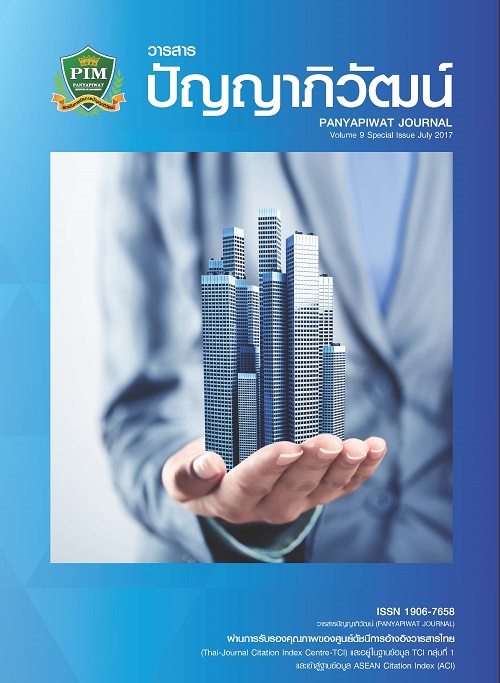แนวทางการส่งเสริมทรัพย์สินทางปัญญาภายใต้เศรษฐกิจดิจิทัล: กรณีศึกษาธุรกิจเพลงในประเทศไทย
Main Article Content
บทคัดย่อ
การศึกษาแนวทางการส่งเสริมทรัพย์สินทางปัญญาภายใต้เศรษฐกิจดิจิทัล: กรณีศึกษาธุรกิจเพลงในประเทศไทย มีความมุ่งหมายที่จะศึกษาสภาพปัญหาของทรัพย์สินทางปัญญา (ลิขสิทธิ์) กับธุรกิจเพลงในประเทศไทย เพื่อเสนอแนวทางและปัจจัยส่งเสริมความสำเร็จในการปกป้องทรัพย์สินทางปัญญา (ลิขสิทธิ์) โดยใช้กระบวนการวิจัยเชิงคุณภาพโดยการสัมภาษณ์เชิงลึกการสนทนากลุ่มและการศึกษาเอกสาร จากการศึกษาพบว่า ปัญหาของทรัพย์สินทางปัญญา (ลิขสิทธิ์) ของธุรกิจเพลงไทยในยุคเศรษฐกิจดิจิทัลนั้นมีปัญหาการละเมิดทรัพย์สินทางปัญญา สามารถแบ่งได้ดังนี้ 1) ปัญหาการเผยแพร่ต่อสาธารณะ 2) ปัญหาการหลีกเลี่ยงการจ่ายค่าลิขสิทธิ์ 3) ปัญหาด้านการบังคับใช้กฎหมาย 4) ปัญหาการขาดจิตสำนึกในการละเมิดทรัพย์สินทางปัญญา 5) ปัญหาการรับรู้และการรักษาสิทธิ์ การศึกษานี้ได้เสนอแนวทางส่งเสริมการปกป้องทรัพย์สินทางปัญญาในธุรกิจเพลงไทย ดังนี้ 1) การส่งเสริมการทำงานแบบบูรณาการและร่วมมือกัน 2) การส่งเสริมการปกป้องทรัพย์สินทางปัญญาของหน่วยงานภาครัฐ 3) การส่งเสริมการเรียนรู้และการปกป้องทรัพย์สินทางปัญญา ระหว่างนักร้อง ค่ายเพลง ผู้แต่งเพลง จากผลการศึกษาสามารถวิเคราะห์เกี่ยวกับปัจจัยที่ส่งเสริมความสำเร็จในการปกป้องทรัพย์สินทางปัญญาของธุรกิจเพลงในประเทศไทยคือ 1) ปัจจัยในการปรับตัว 2) ความร่วมมือกันในภาคธุรกิจเพลง 3) การสร้างการสื่อสารที่มีประสิทธิภาพ 4) การสร้างความร่วมมือร่วมกัน 5) การมีจิตสำนึก
The article has recommended the milestones to protect copyright law in Thai Music Business. This article has found that there are still problems continuously in Thai music business as follows: 1) Unauthorized use by non-copyright holders 2) Royalty Payment 3) Legal Enforcement 4) Lack of Intellectual Property rights awareness among stakeholders 5) Rights of Copyright holder. The research has recommended to protect Thai music business as follows: 1) There should be cooperation among stakeholders in the business with regard to information and data users. 2) IPRs promotion and protection campaign by public sector 3) IPRs Knowledge sharing between singer music company and song writer. There are five key factors to protect copyright in Thai music business as follows: 1) Adaptability 2) Cooperation of stakeholders in music industry 3) Effective communication 4) Close cooperation to protect intellectual property rights both private and public sectors 5) Awareness and consciousness of consumer.
Article Details
“ข้าพเจ้าและผู้เขียนร่วม (ถ้ามี) ขอรับรองว่า บทความที่เสนอมานี้ยังไม่เคยได้รับการตีพิมพ์และไม่ได้อยู่ระหว่างกระบวนการพิจารณาลงตีพิมพ์ในวารสารหรือแหล่งเผยแพร่อื่นใด ข้าพเจ้าและผู้เขียนร่วมยอมรับหลักเกณฑ์การพิจารณาต้นฉบับ ทั้งยินยอมให้กองบรรณาธิการมีสิทธิ์พิจารณาและตรวจแก้ต้นฉบับได้ตามที่เห็นสมควร พร้อมนี้ขอมอบลิขสิทธิ์บทความที่ได้รับการตีพิมพ์ให้แก่สถาบันการจัดการปัญญาภิวัฒน์หากมีการฟ้องร้องเรื่องการละเมิดลิขสิทธิ์เกี่ยวกับภาพ กราฟ ข้อความส่วนใดส่วนหนึ่งและ/หรือข้อคิดเห็นที่ปรากฏในบทความข้าพเจ้าและผู้เขียนร่วมยินยอมรับผิดชอบแต่เพียงฝ่ายเดียว”
เอกสารอ้างอิง
Changkhan, V. (2004). Business Opportunity for newcomer in Music industry. Master of Economics, Thammasart University. [in Thai]
Department of Intellectual Property Protection. (2014). TheIntroduction of Intellectual Property Protection. Retrieved February 10, 2016, from https://www.ipthailand.go.th/th/faq/item/ความรู้เบื้องต้น-ด้านทรัพย์สินทางปัญญา.html [in Thai]
Department of Intellectual Property. (2010). Intellectual Property Management for Education Institutions or Public Innovation Organization.Nontaburi: Province Ministry of Commerce. [in Thai]
Fungjaizine. (2015). From Top to Bottom Back to Basic. Retrieved January 25, 2016, from https://www.fungjaizine.com/music-industry/back-to-basics [in Thai]
Fungjaizine. (2015). Revolution of Music Industry. Retrieved January 25, 2016, from https://www.fungjaizine.com/music-industry/music-revolution [in Thai]
Hemmaratchata, C. (1993). Principle of Copyrights Law (1st ed.). Bangkok: Nitithum. [in Thai]
Jazz Journalists Association. (2011). Graph shows music sales decline. Retrieved January 16, 2016, from https://news.jazzjournalists.org/2011/02/graph-shows-music-sales-decline/#sthash.V680fSzP.dpufKusumavalee, S. (2015). Creative Economy.Bangkok: Chulalongkorn University Press. [in Thai]
Lapprisut, P. (2009). Factor determining success of Online Music. Independent study for Master degree in Information Management, Faculty of Commerce and Accountancy, Thammasart University. [in Thai]
Limpichai, S. (1993). Cassette Tape in Music Industry (1st ed.). Bangkok: HTP Press. [in Thai]
National Science and Technology Development Agency. (2008). A study of Intellectual Property System for Knowledge and Social based Society. Pathumthani: National Science and Technology Development Agency. [in Thai]
Pichaiphaet, N. (2010). Adapting Paradigm of Thai Music Industry. Master of Arts Cultural Management, College of Innovation Thammasart University. [in Thai]
Ruangsakul, P. (2001). Becoming a singer in Thai music industry.Master, Communication Arts (Mass Communication), Chulalongkorn University. [in Thai]
Suthidara, K. (2003). Emerging to Internet World. Bangkok: Info Press Publishing House. [in Thai]
Thai Entertainment Content Trade Association. (2014). Market Share in Music Industry. Retrieved January 28, 2016, from https://marketeer.co.th/archives/10740 [in Thai]
The secretariat of the committee for Social and Economic Digital Preparation. (2016). Digital vs Analog. Retrieved February 5, 2016, from https://www.digitalthailand.in.th/digital-thailandplan[in Thai]
The secretariat of the House of Representatives. (2015). Digital Economy: the drives of New Economic Policy. Retrieved February 15, 2016, from https://library2.parliament.go.th/ejournal/content_af/2558/mar2558-2.pdf[in Thai]
The Stock Exchange of Thailand. (2014). Companies/ Securities in Focus RS Public Company Limited.Retrieved January 25, 2016, from https://www.set.or.th/set/companyhighlight.do?symbol=RS[in Thai]
U.S. Department of Commerce. (1999). The Emerging Digital Economy. Retrieved January 16, 2016, from https://www.esa.doc.gov/sites/default/files/emergingdig_0.pdf


